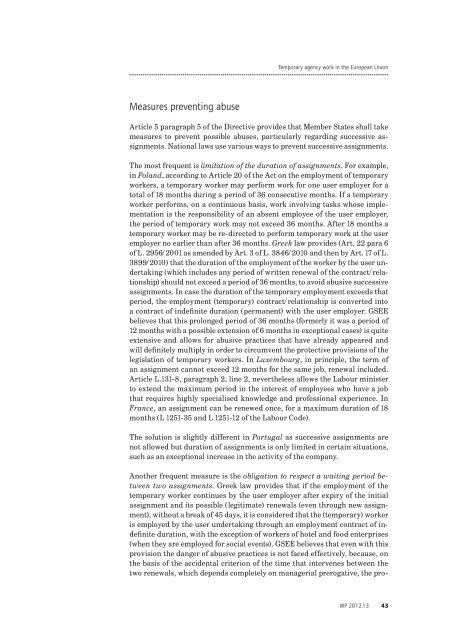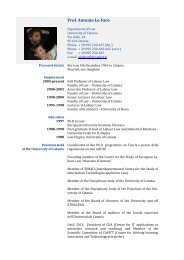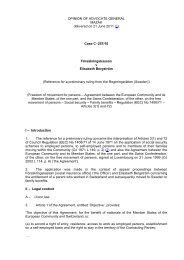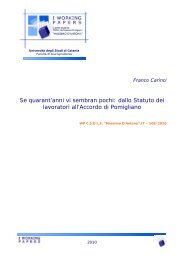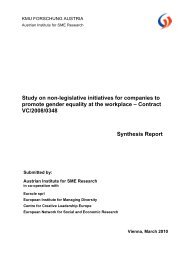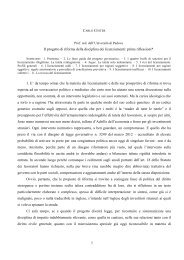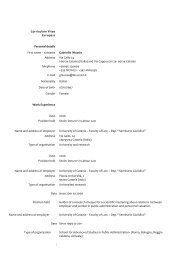Full text - European Trade Union Institute (ETUI)
Full text - European Trade Union Institute (ETUI)
Full text - European Trade Union Institute (ETUI)
You also want an ePaper? Increase the reach of your titles
YUMPU automatically turns print PDFs into web optimized ePapers that Google loves.
Temporary agency work in the <strong>European</strong> <strong>Union</strong><br />
Measures preventing abuse<br />
Article 5 paragraph 5 of the Directive provides that Member States shall take<br />
measures to prevent possible abuses, particularly regarding successive assignments.<br />
National laws use various ways to prevent successive assignments.<br />
The most frequent is limitation of the duration of assignments. For example,<br />
in Poland, according to Article 20 of the Act on the employment of temporary<br />
workers, a temporary worker may perform work for one user employer for a<br />
total of 18 months during a period of 36 consecutive months. If a temporary<br />
worker performs, on a continuous basis, work involving tasks whose implementation<br />
is the responsibility of an absent employee of the user employer,<br />
the period of temporary work may not exceed 36 months. After 18 months a<br />
temporary worker may be re-directed to perform temporary work at the user<br />
employer no earlier than after 36 months. Greek law provides (Art. 22 para 6<br />
of L. 2956/2001 as amended by Art. 3 of L. 3846/2010 and then by Art. 17 of L.<br />
3899/2010) that the duration of the employment of the worker by the user undertaking<br />
(which includes any period of written renewal of the contract/relationship)<br />
should not exceed a period of 36 months, to avoid abusive successive<br />
assignments. In case the duration of the temporary employment exceeds that<br />
period, the employment (temporary) contract/relationship is converted into<br />
a contract of indefinite duration (permanent) with the user employer. GSEE<br />
believes that this prolonged period of 36 months (formerly it was a period of<br />
12 months with a possible extension of 6 months in exceptional cases) is quite<br />
extensive and allows for abusive practices that have already appeared and<br />
will definitely multiply in order to circumvent the protective provisions of the<br />
legislation of temporary workers. In Luxembourg, in principle, the term of<br />
an assignment cannot exceed 12 months for the same job, renewal included.<br />
Article L.131-8, paragraph 2, line 2, nevertheless allows the Labour minister<br />
to extend the maximum period in the interest of employees who have a job<br />
that requires highly specialised knowledge and professional experience. In<br />
France, an assignment can be renewed once, for a maximum duration of 18<br />
months (L 1251-35 and L 1251-12 of the Labour Code).<br />
The solution is slightly different in Portugal as successive assignments are<br />
not allowed but duration of assignments is only limited in certain situations,<br />
such as an exceptional increase in the activity of the company.<br />
Another frequent measure is the obligation to respect a waiting period between<br />
two assignments. Greek law provides that if the employment of the<br />
temporary worker continues by the user employer after expiry of the initial<br />
assignment and its possible (legitimate) renewals (even through new assignment),<br />
without a break of 45 days, it is considered that the (temporary) worker<br />
is employed by the user undertaking through an employment contract of indefinite<br />
duration, with the exception of workers of hotel and food enterprises<br />
(when they are employed for social events). GSEE believes that even with this<br />
provision the danger of abusive practices is not faced effectively, because, on<br />
the basis of the accidental criterion of the time that intervenes between the<br />
two renewals, which depends completely on managerial prerogative, the pro-<br />
WP 2012.13 43


